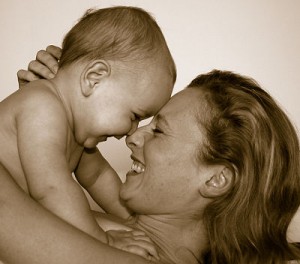 Along with a good supply of onesies, I routinely counsel expectant parents to stock up on trust. Parenting is a daunting safari into the unknown, and trust is the anxiety antidote when life outruns the reach of our techno-savvy that has us convinced we can figure out and control everything in our lives.
Along with a good supply of onesies, I routinely counsel expectant parents to stock up on trust. Parenting is a daunting safari into the unknown, and trust is the anxiety antidote when life outruns the reach of our techno-savvy that has us convinced we can figure out and control everything in our lives.
I define trust as “calm reliance upon processes outside of your immediate perception and control,” and it is one of the seven principles that weave through my book Parenting for Peace. For those of us weaned on the information revolution, trust is probably the most subversive P4P principle of them all. When it isn’t overwhelming us, our instant access to infinite amounts of data on any topic has us convinced that by virtue of our techno-savvy, we can indeed figure out and be in charge of every aspect of our lives.
But Life will always manage to outrun your techno-management, trust me. Begin now, I tell new parents, to cultivate a fond taste for mystery and the unfathomable. This ensures that by the time your child gets behind the wheel of a car — and you need trust like never before — it will be well-established and enduring, like a beautiful rosebush whose roots can reach deep beneath drought-ridden topsoil to find life-sustaining water. Trust brings you to an unparalleled source of strength, paradoxically called “surrender,” which might just be the most important resource in your parenting toolbox!
There’s an App for That
Let’s take the example of electronic imaging technology in pregnancy. We no longer give a second thought to it, despite the fact that routine (as opposed to medically indicated) ultrasound use does not improve maternal or infant outcomes,[1] and despite mounting data suggesting it may carry unnecessary risks,[2]it has become the ubiquitous Baby’s First Photograph, and is now typically done during every prenatal visit.
The ultrasound screen gives way to the electronic fetal monitor, which morphs into the radio-frequency baby monitor at home, baby-care smartphone apps, and before long a GPS tracking app on the child’s cell phone.** And all the while our inner knowing atrophies. Our capacity to trust diminishes. No wonder anxiety roils when our children finally begin venturing beyond our electronic surveillance net: as in the universal dream that features the I-never-went-to-class-and-today-is-the-final-exam panic, we are faced with the anguish of worrying, pacing and nagging if we have neglected year after year after year to foster and engage in a trusting collaboration with Life.
[**I write that facetiously: while I know that many of them do, I stand my ground and say that children shouldn’t tote cell phones, if just for neuro-developmental reasons.]
5 Practices to Cultivate Trust
- If you are a list-maker, experiment with foregoing your “To Do” list for one week, with the conscious intention of inviting unseen energies within and outside yourself to organize what takes place. Yes, you’ll forget some items, but what a delight to be guided into unplanned activities. (A frequent side effect is when you realize that the things you forgot were accomplished on another day more fruitfully, in light of new circumstances.)
- Make friends with your uncertainties and worries: Hi, there, I know you well. Thank you for reminding me that <fill in blank with situation heavily on your mind>. I’m trusting it will all resolve in the way that’s right. Meditation and mindfulness are two of the best approaches to this maneuver.
- When we want to develop an attitude more fully (such as trust), it helps to strive toward being worthy of that same virtue. One of the simplest yet most potent ways to develop trust is to build within yourself your own trustworthiness. Try to make your words and actions coincide with what is. If you say “I’ll meet you at three,” then be there at three. Don’t exaggerate (“It took forever in line at the bank” is really “I waited much longer than I was expecting to”) and don’t “ultimize” (“I’ll never do that again”…“It was the worst thing ever”). Practicing this kind of self-mastery will imbue you with a natural inner authority that makes parenting easier. And you’ll be many steps ahead when your children become preteens and teens, and fervently want their parents’ words to align with what truly is.
 To inspire you as you cultivate this principle of trust, take in the words of poet Kahlil Gibran from his classic book The Prophet: “Your children are not your children. They are the sons and daughters of Life’s longing for itself.” Recognize that you are a collaborator with Life and detach a bit from the intensely personalized notion of our children. This can help refresh the atmosphere surrounding any stage of parenting with a more expansive perspective and the comfort of knowing you are not on your own!
To inspire you as you cultivate this principle of trust, take in the words of poet Kahlil Gibran from his classic book The Prophet: “Your children are not your children. They are the sons and daughters of Life’s longing for itself.” Recognize that you are a collaborator with Life and detach a bit from the intensely personalized notion of our children. This can help refresh the atmosphere surrounding any stage of parenting with a more expansive perspective and the comfort of knowing you are not on your own!- When preteen years giving way to teen years (which will be followed after that by driving and increased autonomy outside your sphere of direct influence), trust becomes a big issue for many parents. Tending your trust stores from the beginning can be a tremendous help — just like undertaking a training regimen years before a demanding hiking trip. Bodymind pioneer Louise Hay reminds us that the level of trusting surrender that we bring to our breathing is the level of trusting surrender we can bring to every aspect of life: most of us don’t fret or even give a thought to whether there will be a breath waiting to come in after we exhale! Just as our lungs, guided by intricate mechanisms in our brainstem, breathe without us controlling them, so too our lives very often breathe along better without our meddling attempts at direction. This is certainly true of parenting, in a paradoxical way: of course we need to make plans, have structures and boundaries in place, and have goals and visions, certainly. And then we let those intentions breathe us. We can “live out of pure trust,” in the words of Rudolf Steiner: “Truly, nothing else will do if our courage is not to fail us. And let us seek the awakening from within ourselves, every morning and every evening.”

[1] Gaskin, Ina May. Ina May’s Guide to Childbirth. New York: Bantam-Dell, 2003.
[2] Ziskin, M. C., and S. B. Barnett. “Ultrasound and the Developing Central Nervous System.” Ultrasound Med Biol 27, no. 7 (2001): 875-6.
[3] Davis-Floyd, Robbie, and Joseph Dumit. “From Technobirth to Cyborg Babies: Reflections on the Emergent Discourse of a Holistic Anthropologist.” In Cyborg Babies: From Techno-Sex to Techno-Tots, edited by Robbie Davis-Floyd and Joseph Dumit. New York: Routledge, 1998.
Images:
Katie Tegtmeyer through Creative Commons license
Robert Whitehead through Creative Commons license
Pink Sherbet Photography through Creative Commons license
Tags: information overwhelm, Robbie Davis-Floyd, technology, teens, trust, ultrasound


